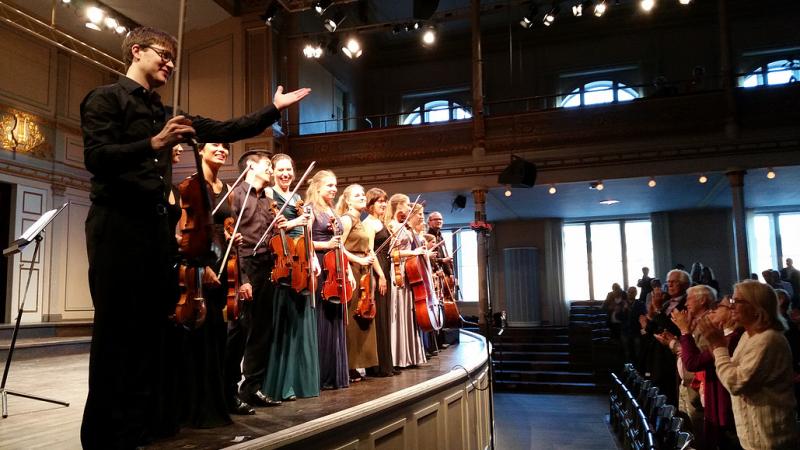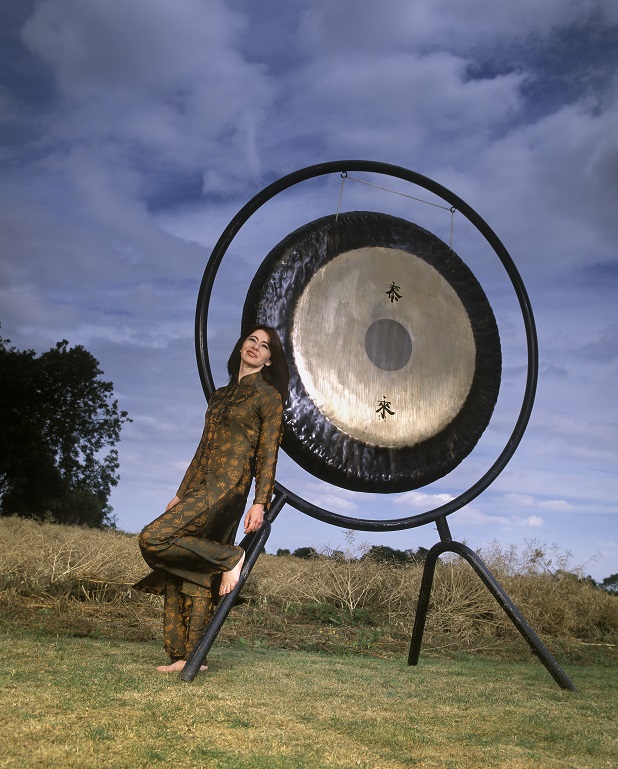Glennie, Ticciati, O/Modernt Kammarorkester, Kings Place | reviews, news & interviews
Glennie, Ticciati, O/Modernt Kammarorkester, Kings Place
Glennie, Ticciati, O/Modernt Kammarorkester, Kings Place
Percussion and strings, contemporary and Tchaikovsky, brilliantly interwoven

It is a truth not widely acknowledged in the UK as yet that Robin Ticciati's elder brother Hugo is no less fine a shaper of musical thought. He could, as his solo playing last night richly proved, have had a career as a virtuoso violinist playing with all the world's great orchestras.
As soloist, he had no fear of comparisons here with the ever-phenomenal Evelyn Glennie. Those passages in Jill Jarman's Mindstream where the violin sparred with marimba and vibraphone ricochets felt like white-heat improvisation – we could have done with even more of that between the two. Improvisation there was, for all the strings glissandoing into what sounded like Dowland. That followed Glennie's breathtaking opener, Prim, a solo for snare drum composed by Iceland's top composer Áskell Másson.
Jarman's first-half main event was fitful in a way that the awkwardly-expressed premise advising us to live in the moment maybe hadn't contemplated: meandering Piazzolla-lite moodiness punctuated by syncopated, jazzy, dancing brilliance. It was entirely thanks to the rhythmic knife-cut of all involved that the dances, and above all the buzzing last minutes, worked so well.
 The real mindfulness-meditation sequence would have been Glennie's tam-tam solo (the two pictured right by Eric Richmond) after the interval, notated in James Tenney's Having Never Written a Note for Percussion as a single-note crescendo and diminuendo over 12 or so minutes. What broke the spell not long into the near-silence were coughs, sneezes, whispers and what sounded like exploding temperance beverages: you had to laugh when you needed to be entirely focused on the infinite variety of timbres and overtones Glennie could produce by moving her two sponged sticks over the surface of the instrument.
The real mindfulness-meditation sequence would have been Glennie's tam-tam solo (the two pictured right by Eric Richmond) after the interval, notated in James Tenney's Having Never Written a Note for Percussion as a single-note crescendo and diminuendo over 12 or so minutes. What broke the spell not long into the near-silence were coughs, sneezes, whispers and what sounded like exploding temperance beverages: you had to laugh when you needed to be entirely focused on the infinite variety of timbres and overtones Glennie could produce by moving her two sponged sticks over the surface of the instrument.
Players, if not the audience, were fully focused, sitting on the floor and then rising quietly one by one to launch straight into Tchaikovsky's Serenade for Strings. In what is perhaps his sunniest work, and certainly one of his top masterpieces, the composer gets the most out of rising and falling scales, or portions of scales. Ticciati so clearly led his fellow strings to draw even more from them with an infinite variety of dynamics.
The Élégie's framing tendernesses drew more shades of piano than one would have thought possible; the opening movement's dance was disciplined and nuanced, the finale's folk tunes allowed the players to rip and pluck with a joyful modernity that was wholly appropriate. And above all Ticciati showed his directing, for which read conducting, instinct as leader with the most perfect openings and endings of movements, the mark of real greatness in music-making, and a rubato throughout the ineffable waltz of which brother Robin would have wholeheartedly approved.
rating
Explore topics
Share this article
Add comment
The future of Arts Journalism
You can stop theartsdesk.com closing!
We urgently need financing to survive. Our fundraising drive has thus far raised £33,000 but we need to reach £100,000 or we will be forced to close. Please contribute here: https://gofund.me/c3f6033d
And if you can forward this information to anyone who might assist, we’d be grateful.

Subscribe to theartsdesk.com
Thank you for continuing to read our work on theartsdesk.com. For unlimited access to every article in its entirety, including our archive of more than 15,000 pieces, we're asking for £5 per month or £40 per year. We feel it's a very good deal, and hope you do too.
To take a subscription now simply click here.
And if you're looking for that extra gift for a friend or family member, why not treat them to a theartsdesk.com gift subscription?
more Classical music
 Verdi Requiem, Philharmonia, Muti, RFH review - new sparks from an old flame
Discoveries on a veteran maestro's epic journey
Verdi Requiem, Philharmonia, Muti, RFH review - new sparks from an old flame
Discoveries on a veteran maestro's epic journey
 Batsashvili, Hallé, Wong, Bridgewater Hall, Manchester review - a star in the piano universe
The Georgian pianist brings precision and freedom to Liszt’s warhorses
Batsashvili, Hallé, Wong, Bridgewater Hall, Manchester review - a star in the piano universe
The Georgian pianist brings precision and freedom to Liszt’s warhorses
 Naumov, SCO, Egarr, Queen's Hall, Edinburgh review - orchestral magic rescues some punishing music
Hard-driven Beethoven, monotonous Eötvös, some light from Kernis
Naumov, SCO, Egarr, Queen's Hall, Edinburgh review - orchestral magic rescues some punishing music
Hard-driven Beethoven, monotonous Eötvös, some light from Kernis
 Classical CDs: Shipping lines, sabre dances and sea lice
Neglected piano concertos, Italian art songs and new music for trombones
Classical CDs: Shipping lines, sabre dances and sea lice
Neglected piano concertos, Italian art songs and new music for trombones
 Il trionfo del Tempo e del Disinganno, Irish Baroque Orchestra, Whelan, St George’s Hanover Square review - Handel’s journey of a soul
Pleasure gets the best deal despite Beauty’s struggle to higher things
Il trionfo del Tempo e del Disinganno, Irish Baroque Orchestra, Whelan, St George’s Hanover Square review - Handel’s journey of a soul
Pleasure gets the best deal despite Beauty’s struggle to higher things
 Uproar, Rafferty, Royal Welsh College, Cardiff review - colourful new inventions inspired by Ligeti
Unfussy professionalism from Wales-based new music ensemble
Uproar, Rafferty, Royal Welsh College, Cardiff review - colourful new inventions inspired by Ligeti
Unfussy professionalism from Wales-based new music ensemble
 Attacca Quartet, Kings Place review - bridging the centuries in sound
Grammy-winning quartet bring more American punch than Gallic je-ne-sais-quoi to Ravel
Attacca Quartet, Kings Place review - bridging the centuries in sound
Grammy-winning quartet bring more American punch than Gallic je-ne-sais-quoi to Ravel
 Manchester Collective, RNCM review - exploring new territory
The string quartet – plus percussion and electronics – goes on a journey
Manchester Collective, RNCM review - exploring new territory
The string quartet – plus percussion and electronics – goes on a journey
 Bavouzet, BBCSO, Stasevska, Barbican review - ardent souls in mythic magic
Vivid realisation of fantastical masterpieces by Bartók, Ravel and Janáček
Bavouzet, BBCSO, Stasevska, Barbican review - ardent souls in mythic magic
Vivid realisation of fantastical masterpieces by Bartók, Ravel and Janáček
 Levit, Budapest Festival Orchestra, Fischer, RFH review - anger unleashed, fantasy finessed in Prokofiev
Instant communication from Berlin-based pianist and Hungarian army of generals
Levit, Budapest Festival Orchestra, Fischer, RFH review - anger unleashed, fantasy finessed in Prokofiev
Instant communication from Berlin-based pianist and Hungarian army of generals
 A Form of Exile: Edward Said and Late Style, CLS, Wood, QEH review - baggy ferment of ideas and sounds
Superlative actors and musicians in an over-ambitious event running to three hours
A Form of Exile: Edward Said and Late Style, CLS, Wood, QEH review - baggy ferment of ideas and sounds
Superlative actors and musicians in an over-ambitious event running to three hours

Comments
Very snarky about Jill
Not snarky at all; I just
Not snarky at all; I just didn't think it was great music. Yes, it served the players, but there's no inconsistency in failing to find it original, let alone a masterpiece, OR 'the highlight of a thrilling evening' (in your opinion).
I don't understand your last sentence. But let me just quote the last sentence on Mindstream: 'Musically, the listener is invited to let go of motif, idea, phrase and finally an entire soundscape in order to remain fully present in the passing moment'. Lofty claims for a piece of light entertainment.